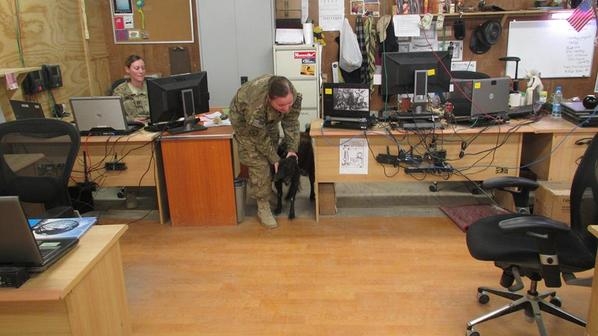IS-linked hackers seize US Centcom social media accounts

A group declaring sympathy for Islamic State (IS) militants hacked US Central Command's social media accounts on Monday, forcing the military to take down the command's Twitter feed.
In an embarrassing propaganda jab at the US military, a black-and-white banner with the image of a hooded fighter and the words "CyberCaliphate" and "I love you ISIS" replaced Central Command's usual logo.
But the Pentagon played down the effect of the hacking, saying it amounted to little more than digital vandalism and that no sensitive military computer networks were penetrated.
"Centcom didn't get hacked. Twitter got hacked," Colonel Steven Warren told reporters.
"It's important to keep this whole thing in perspective. This is little more than a cyber prank. It's an annoyance," he said. "It in no way compromises our operations."
Before the Twitter feed was suspended, the hackers wrote on the seized account that the self-styled CyberCaliphate "is already here, we are in your PCs, in each military base."
Another post said: "American soldiers, we are coming, watch your back."
Central Command, based in Tampa, Florida, oversees the US-led air war against the group in Iraq and Syria and other American operations in the Middle East and Horn of Africa.
In another embarrassing twist, the hacking of the social media accounts came as President Barack Obama was delivering a speech on cyber security.
The White House said there was no sign that sensitive data had been exposed.
"It's a pretty significant difference between what is a large data breach and the hacking of a Twitter account," White House spokesman Josh Earnest told reporters.
"We're examining and investigating the extent of this incident."
The hackers posted various documents on the Twitter feed but US officials said it appeared none of them were classified.
"The majority of the documents posted by the hackers are publicly available," one Pentagon official told AFP.
The hackers appeared to have used screen shots on defense-related topics from other websites, giving the impression that they had stolen secret documents, officials said.
Some of the documents were labeled "FOU," or for office use only, which refers to Defense Department documents that are not top secret or classified but normally treated as confidential.
The hacked Twitter feed posted what appeared to be an office phone directory of officers, which was slightly out of date, as well what appeared to be a personal photo taken by troops handling a goat in an office.
Some power point slides related to North Korea and China were also posted, but there was no sign of classified information on the slides.
One image showing North Korea's nuclear facilities had appeared previously on the website of the Federation of American Scientists, a Washington-based non-profit organization dedicated to preventing nuclear war.
US commanders and senior officials have previously said the IS group has shown a great acumen for propaganda and for promoting itself to potential recruits.
The US government has been preoccupied with another, more serious cyber attack on the Hollywood studio Sony Pictures, which suffered a massive data breach in late November.
Hackers stole and posted online information from Sony employees, unreleased films and a trove of emails between top company executives - some of them with embarrassing comments.
A group calling itself Guardians of Peace claimed credit for the attack and issued threats against Sony over the planned release of the comedy film "The Interview," which depicts a fictional CIA plot to kill North Korea's leader.
After an investigation, the FBI blamed North Korea for the attack on Sony and Washington has imposed fresh sanctions on Pyongyang over the intrusion.
New MEE newsletter: Jerusalem Dispatch
Sign up to get the latest insights and analysis on Israel-Palestine, alongside Turkey Unpacked and other MEE newsletters
Middle East Eye delivers independent and unrivalled coverage and analysis of the Middle East, North Africa and beyond. To learn more about republishing this content and the associated fees, please fill out this form. More about MEE can be found here.




